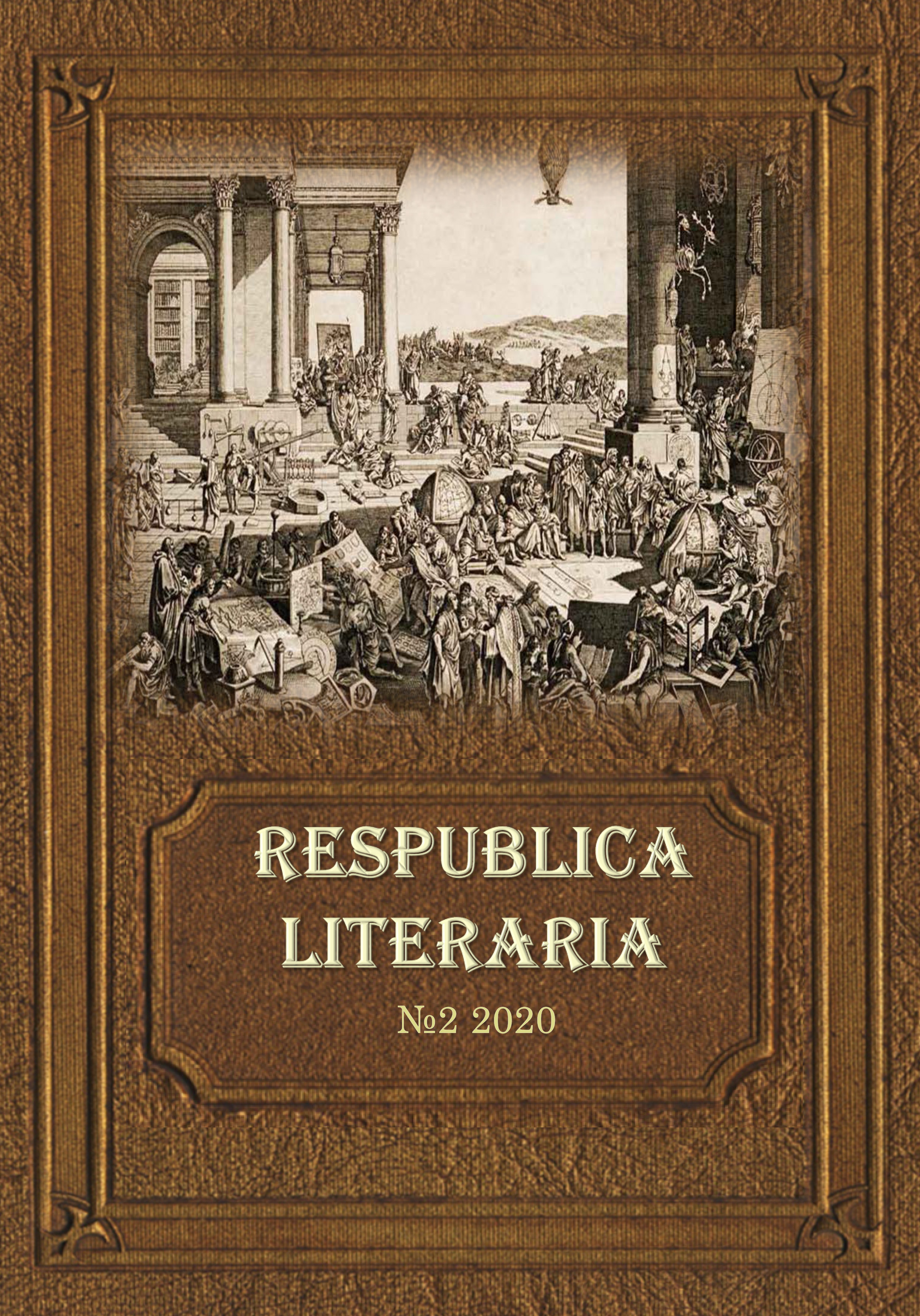Kim I. E., Ilina D. V. The invisible opponent: a hidden discussion in a linguistic popular science article
DOI:
https://doi.org/10.47850/RL.2020.1.2.166-183Keywords:
implicitness, everyday and scientific picture of the world, genre of popular science articles, authorization, reference, point of view, personal pronoun, figurative meaning of a personAbstract
This article is devoted to the description of the linguistic means by which the author of a popular science article introduces into it the position of an “inexperienced reader”. Six popular science articles on linguistic topics were used as a source of material for the research. With the methods of studies of reference, semantic syntax and poetics of a literary text, the techniques of introducing an ordinary worldview of the “invisible opponent” of the author-scientist (or a knowledgeable journalist) were analyzed, in which the author represents a potential inexperienced reader of the article. As a result of the study, it was found that the authors use various means of implicitness, including presuppositions, implicit change of point of view, games with the reference of pronouns and nouns, in order to solve a complex collision of the “addressee factor”: criticizing the views that form the reader's everyday picture of the world, do not present explicit the reader himself as his opponent.
References
Арутюнова, Н. Д. (1981). Фактор адресата. Известия Академии наук СССР. Серия литературы и языка. № 4. С. 356-367.
Arutyunova, N. D. (1981). Addressee Factor. Bulletin of the USSR Academy of Sciences. The series of Literature and Language. Vol. 40. no. 4. pp. 356-367. (In Russ.)
Байков, В. Г. (1990). Антропоцентризм языка и поэтика точки зрения. Общая стилистика: теоретические и прикладные аспекты. Калинин. С. 4-24.
Baikov, V. G. (1990). Anthropocentrism of Language and Poetics of the Point of View. In General stylistics: theoretical and applied aspects. Kalinin. pp. 4-24. (In Russ.)
Баринова, А. (2015). Оттенки синего. Когда мы научились различать новый цвет. National Geographic. [Электронный ресурс]. URL: http://www.nat-geo.ru/planet/310041-ottenki-sinego-kogda-my-nauchilis-razlichat-novyy-tsvet/ (Дата обращения: 07.11.2020).
Barinova, A. (2015). Shades of blue. When we learned to distinguish a new color. National Geographic. [Online]. URL: http://www.nat-geo.ru/planet/310041-ottenki-sinego-kogda-my-nauchilis-razlichat-novyy-tsvet/ (Accessed: 7 Novenber 2020). (In Russ.)
Бахтин, М. М. (1994). Проблемы творчества Достоевского. Киев.
Bakhtin, M. M. (1994). Problems of Dostoevsky's Works. Kiev. (In Russ.)
Волошинов, В. Н. (1930). Марксизм и философия языка. Основные проблемы социологического метода в науке о языке. Л.
Voloshinov, V. N. (1930). Marxism and the Philosophy of Language. The Main Problems of the Sociological Method in the Science of Language. Leningrad. (In Russ.)
Гуревич, А. Я. (1990). Средневековый мир: культура безмолвствующего большинства. М.
Gurevich, A. Ya. (1990). Medieval World: The Culture of the Silent Majority. Moscow. (In Russ.)
Донских, О. (2016). «Язык – это ложь». Как и почему человечество научилось врать. Земля. Хроники жизни. [Электронный ресурс]. URL: http://earth-chronicles.ru/news/2016-04-03-90758 (Дата обращения: 12.11.2020).
Donskikh, O. (2016). “Language is a lie.” How and why humanity learned to lie. Earth. Chronicles of Life. [Online]. URL: http://earth-chronicles.ru/news/2016-04-03-90758 (Accessed: 12 November 2020). (In Russ.)
Ефимов, А. (2016). Поклоно ѿ Онѳима. N+1. [Электронный ресурс]. URL: https://nplus1.ru/material/2016/01/29/birchtree (Дата обращения: 12.11.2020).
Efimov, A. (2016). Greeting from Onfim. N+1. [Online]. URL: https://nplus1.ru/material/2016/01/29/birchtree (Accessed: 12 November 2020). (In Russ.)
Ильина, Д. В. (2016). Субъектная организация научно-популярных и псевдонаучных статей лингвистической тематики. Вестник НГУ. Серия: История, филология. Т. 15. № 9: Филология. С. 42-52.
Ilyina, D. V. (2016). Subject Framing of Popular Scientific and Pseudoscientific Linguistic Articles. Vestnik NSU. Series: History and Philology. Vol. 15. no. 9: Philology. pp. 42-52. (In Russ.)
Иомдин, Б. (2014). Как взаимодействуют язык бытовой и язык официальный? Постнаука. [Электронный ресурс]. URL: http://postnauka.ru/faq/34828 (Дата обращения: 15.11.2020).
Iomdin, B. (2014). How do everyday language and official language interact? Post-Science. [Online]. URL: http://postnauka.ru/faq/34828 (Accessed: 15 November 2020). (In Russ.)
Ким, И. Е. (2006). Личный дейксис и личная сфера. Российский лингвистический ежегодник. Вып. 1(8). С. 54-67.
Kim, I. E. (2006). Personal Deixis and Personal Sphere. Russian Linguistic Yearbook. Vol. 1(8). pp. 54-67. (In Russ.)
Ким, И. Е., Ильина, Д. В. (2019). Научно-популярная сфера общения: на границе двух картин мира. Экология языка и коммуникативная практика. № 4 (1). С. 58-69. DOI: 10.17516/2311-3499-077
Kim, I. E., Ilina, D. V. (2019). Popular Science Sphere of Communication: on the Boarder of Two Worldviews. Ecology of Language and Communicative Practice. no. 4(1). pp. 58-69. (In Russ.) DOI: 10.17516/2311-3499-077 (In Russ.)
Литвак, Б. Г. (1971). О некоторых чертах психологии русских крепостных первой половины XIX в. История и психология. М. С. 199-214.
Litvak, B. G. (1971). On Some Features of the Psychology of Russian Serfs in the First Half of the Twentieth Century. In History and Psychology. Moscow. pp. 199-214. (In Russ.)
Лукин, П. В. (2000). Народные представления о государственной власти в России XVII века. М.
Lukin, P. V. (2000). Popular Ideas about State Power in Russia of the 17th Century. Moscow. (In Russ.)
Падучева, Е. В. (2010). Семантические исследования: Семантика времени и вида в русском языке; семантика нарратива. М.
Paducheva, E. V. (2010). Semantic Research: Semantics of Time and Aspect In Russian; Semantics of Narrative. Moscow. (In Russ.)
Пиперски, А. (2015). Введение в индоевропеистику. Постнаука. [Электронный ресурс]. URL: http://postnauka.ru/longreads/48008 (Дата обращения: 18.11.2020).
Piperski, A. (2015). Indo-European linguistics in brief. Post-Science. [Online]. URL: http://postnauka.ru/longreads/48008 (Accessed: 18 November 2020). (In Russ.)
Санников, В. З. (2001). О семантике категорий лица и числа (по данным языковой игры). Традиционное и новое в русской грамматике. Сб. статей памяти В. А. Белошапковой. М. С. 143-154.
Sannikov, V. Z. (2001). On the Semantics of the Category of Person and Number (According to the Language Game). In Tradition and Novelty In Russian Grammar. Collection of Articles in memoriam of V. A. Beloshapkova. Moscow. pp. 143-154. (In Russ.)
Санников, В. З. (1987). Русские сочинительные конструкции (Семантика. Прагматика. Синтаксис): дис. ... д-ра филол. наук. М.
Sannikov, V. Z. (1987). Russian Coordinative Constructions (Semantics. Pragmatics. Syntax). Doctoral (Philology) Dissertation. Moscow. (In Russ.)
Тер-Минасова, С. Г. (2014). Великий и могучий или глобальный? Наука и жизнь. № 9. [Электронный ресурс]. URL: http://www.nkj.ru/archive/articles/24859/ (Дата обращения: 15.11.2020).
Ter-Minasova, S. G. (2014). The great and mighty or global? Science and Life. no. 9. [Online]. URL: http://www.nkj.ru/archive/articles/24859/ (Accessed: 15 November 2020). (In Russ.)
Урысон, Е. В. (2015). Выбор союза и vs. но/а при сочинении двух предложений (уточнение понятий «ожидание» и «норма»). Компьютерная лингвистика и интеллектуальные технологии. Диалог – 2015. Сб. трудов Международной конференции. Вып. 14(21). В 2-х т. М. РГГУ. Т. 1. Основная программа конференции. С. 603–615. URL: http://www.dialog-21.ru/media/2430/urysone.pdf
Uryson, E. V. (2015). Choice of conjunction and vs. but / a when composing two sentences (clarification of the concepts of “expectation” and “norm”). In Computational linguistics and intelligent technologies. Dialogue – 2015. Collection of proceedings of the International Conference. Is. 14 (21). In 2 vols. Moscow. Russian State University for the Humanities. Vol. 1. Main Conference Program. pp. 603–615. URL: http://www.dialog-21.ru/media/2430/urysone.pdf (In Russ.)
Успенский, Б. А. (1970). Поэтика композиции: Структура художественного текста и типология композиционной формы. М.
Uspenskiy, B. A. (1970). Poetics of Composition: The Structure of Literary Text and Typology of Compositional Form. Moscow. (In Russ.)
Химик, В. В. (1990). Категория субъективности и ее выражение в русском языке. Л.
Khimik, V. V. (1990). Category of Subjectivity and its Expression in Russian Language. Leningrad. (In Russ.)
Шмелева, Т. В. (1997). Модель речевого жанра. Жанры речи. Саратов. С. 88-99.
Shmeleva, T. V. (1997). Speech Genre Model. In Speech Genres. Saratov. pp. 88-99. (In Russ.)
Шмелева, Т. В. (1994). Семантический синтаксис: Текст лекций из курса «Современный русский язык». 2-е изд. Красноярск.
Shmeleva, T. V. (1994). Semantic syntax: Script of lectures in discipline “Modern Russian language”. Krasnoyarsk. (In Russ.)
Эйхенбаум, Б. М. (1919). Как сделана «Шинель» Гоголя. Поэтика: Сборники по теории поэтического языка. Петроград. Вып. 3. С. 151-165.
Eykhenbaum, B. M. (1919). How Gogol's “Shinel” (“Overcoat”) has been made. In Poetics: Collections on the theory of poetic language. Petrograd. Vol 3. pp. 151-165. (In Russ.)
Van Eemeren, F. H., Grootendorst, R. (2004). A Systematic Theory of Argumentation: The pragma-dialectical approach. Cambridge. Cambridge University Press.
Downloads
Published
How to Cite
Issue
Section
License

This work is licensed under a Creative Commons Attribution-NonCommercial-NoDerivatives 4.0 International License.
https://oc.philosophy.nsc.ru/remote.php/webdav/%D0%94%D0%BE%D0%B3%D0%BE%D0%B2%D0%BE%D1%80%20%D1%81%20%D0%B0%D0%B2%D1%82%D0%BE%D1%80%D0%BE%D0%BC%20RL-%D0%BF%D1%80%D0%B0%D0%B2.doc










